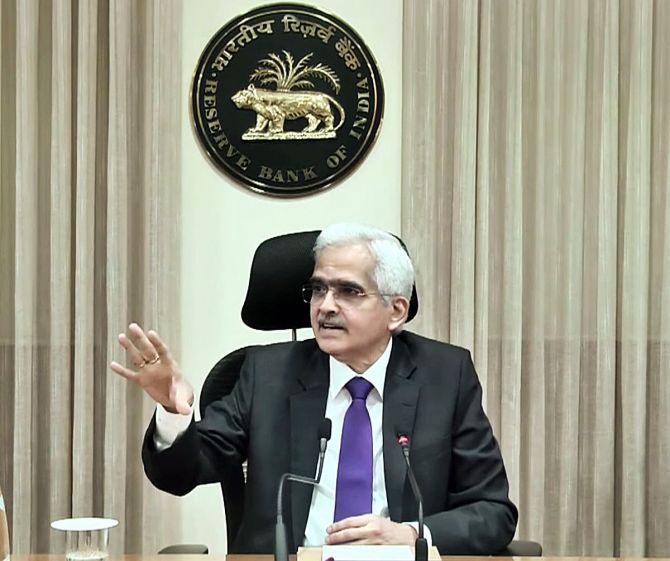The Lok Sabha elections in 2024 are not a consideration when it comes to monetary policymaking, said Reserve Bank of India governor Shaktikanta Das to underscore the central bank’s commitment to controlling inflation.

“It’s not possible for me to comment what we do in the next MPC (Monetary Policy Committee), but one thing I can tell and I would like to make it very clear—that the fact of elections coming up in 2024 is not a factor at all so far as monetary policymaking is concerned.
"Monetary policymaking is for checking (and) controlling inflation,” Das said at the Business Standard, BFSI Insight Summit.
“Everyone is interested in bringing down the inflation, and I’m sure that the government would also be equally keen that inflation is brought down.
"The point is, for monetary policy, what matters--you use the term Arjuna’s eye.
"The Arjuna only looks at inflation and growth. Arjuna is not looking at an election coming up,” he said.
Speaking about inflation forecasting, Das said that the RBI regularly fine-tunes its price forecasting models amid sudden developments.
What was important from the perspective of monetary policy was the direction and the speed of inflation, rather than the number itself.
“Monetary policy is based on the direction of inflation, the broad speed of inflation rise or inflation decline,” he said.
In its December policy review, the MPC raised the repo rate by 35 basis points, taking the cumulative quantum of rate hikes in 2022 to 225 basis points.
Consumer Price Index inflation was at 5.88 per cent in November, marking the first time in 2022 that the price gauge was within the RBI’s 2-6 per cent tolerance zone.
The price gauge has, however, remained above the RBI’s 4 per cent inflation target for 38 consecutive months.
Das expressed confidence in the resilience of the Indian economy, highlighting that several growth indicators used by the RBI were in the “green zone”.
He however, voiced concern about the impact that a global economic slowdown could have on India’s exports and consequently GDP growth.
India’s GDP grew at 6.3 per cent in July-September, slowing down from 13.5 per cent in the previous quarter.
Earlier this month, the RBI marginally reduced its growth forecast for the current financial year to 6.8 per cent from 7 per cent.
Governed by domestic factors
While acknowledging the important role played by the US as the world’s largest economy, Das said, however, that the RBI’s decisions on monetary policy were guided by domestic inflation-growth dynamics.
“Being the largest economy in the world, naturally what the US Fed does, it matters.
"It matters to everyone. A large part of global trade is also dollar-denominated. So, therefore what the US Fed (does) is definitely important for everyone,” he said.
“The actions of the US Fed are considered, are studied, but that’s only one of the factors.
"It’s not as if something the Fed does, we will have to follow that line. I think the days of Big Daddy (referring to the US) is 19th century; it’s no more the case.
"Let me say that primarily we are governed by our domestic (factors),” he said.
Das said that over the last three to four years, the RBI had significantly deepened its supervision in order to safeguard the banking sector.
While bank failures could occur in other parts of the world, such incidents are simply not tolerable in India, Das said.
“In the United States, failure of banks happens, it’s nothing unusual.
"There are cases of bank failures; it happens, everybody takes it.
"In India, failure of a bank is just not acceptable by the public or by anyone,” Das said.
“And everybody looks at the RBI; so it is our responsibility as the regulator and as the supervisor of the banking system to ensure that the banking system is stable, robust and ready to cater to the emerging requirements of the Indian economy,” he said.
He listed out several ways in which the central bank had intensified its regulatory approach while ensuring that the process included constructive and friendly dialogue.
“We are now looking at business models of banks.
"For example, if we find that the unsecured retail portfolio, the unsecured retail loans are rising very fast and they occupy a larger space in the entire lending portfolio of the banks, we immediately flag our concern to the bank but we don’t interfere,” he said.
Credit growth
The RBI governor said that bank deposits would need to grow at a faster pace in order to fund robust credit growth.
He, however, pointed out the role of a statistical base effect in accentuating the sharp divergence that currently exists between credit growth and deposit growth.
“At the current moment, I would like to say, that the credit growth is reflective of the underlying economic fundamentals and growth of the economy,” he said.
“Most of the banks have already started raising the deposit rates and going forward they will definitely take a commercial call.
"They do need deposits. The banks also have a considerable amount of surplus SLR holdings which they have the option to dip in anytime they wish to,” he said.
Speaking on the issue of India’s leadership of the G20, Das stressed upon the crucial need to restore trust in and efficacy of multilateralism.
When it comes to rebuilding multilateral cooperation, India holds a unique position which is embedded in its philosophy, Das said.
“What is very critical and important for the G20 as a group is to restore the trust and efficacy of multilateralism.
"I think over the last few years, multilateralism appears to be losing its efficacy,” Das said.
“Whether in the context of fighting COVID or in the context of dealing with various other global problems.
"I think something which the G20 as a group needs to address collectively, for the G20 as a group, the most important thing is to restore the efficacy and trust built around multilateralism,” he said.












 © 2025
© 2025